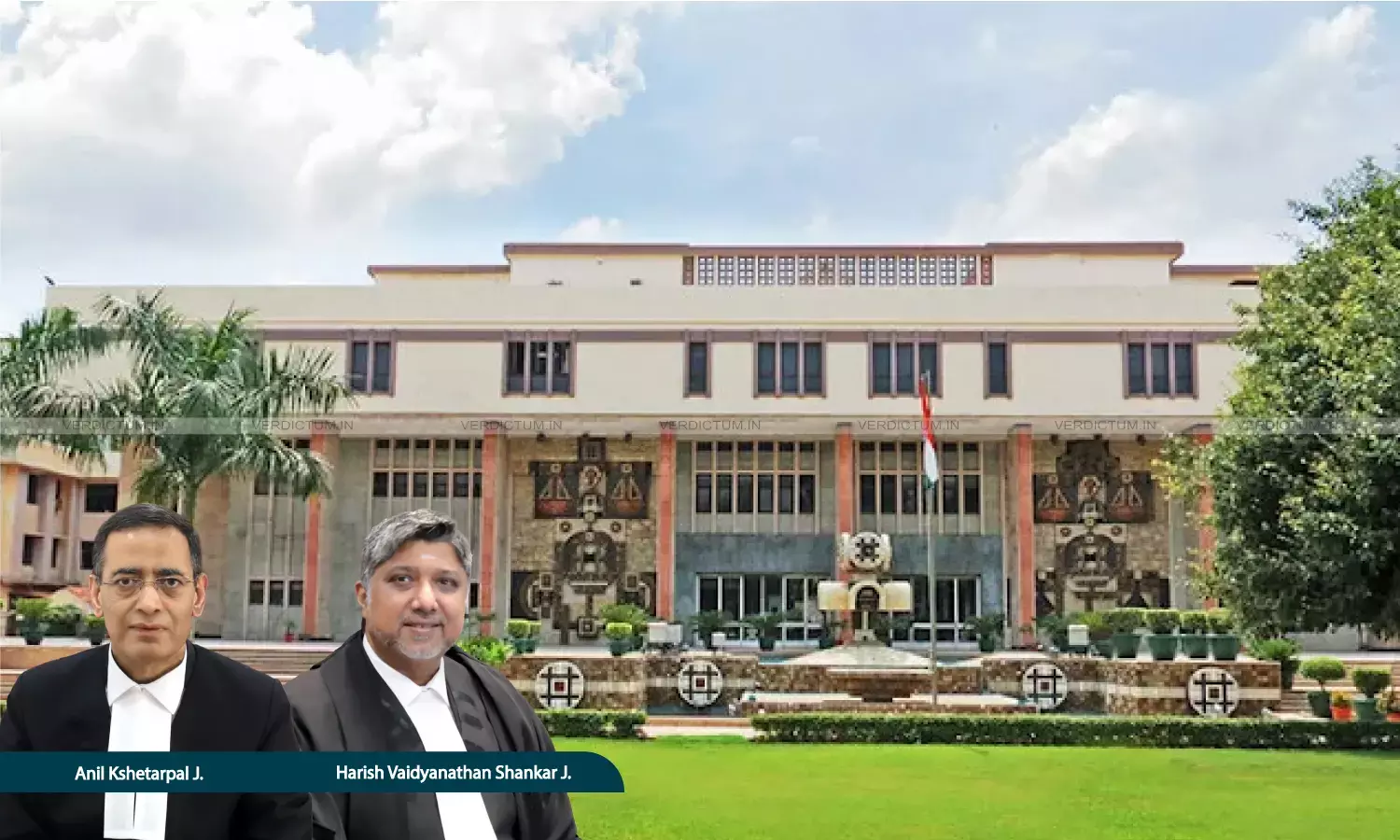Custody Adjudication Can’t Turn On Unproven Imputations Of Moral Conduct: Delhi High Court Upholds Custody Of Children To Mother
The Appeal before the Delhi High Court challenged the correctness of the order of the Family Court, whereby interim custody of the two minor children of the parties was directed to be with the mother.

Justice Anil Kshetarpal and Justice Harish Vaidyanathan Shankar, Delhi High Court
While upholding the grant of custody of children in favour of a mother, the Delhi High Court has held that custody adjudication cannot turn on unproven imputations of moral conduct.
The Appeal before the Delhi High Court challenged the correctness of the order of the Family Court, whereby interim custody of the two minor children of the parties was directed to be with the Respondent-mother, subject to conditions contained therein, while granting defined visitation rights to the Appellant-father.
The Division Bench of Justice Anil Kshetarpal and Justice Harish Vaidyanathan Shankar held, “The Appellant has levelled allegations of extra-marital relationships of the Respondent with certain individuals. These allegations remain unsubstantiated. The Family Court found no admissible or credible evidence to support them, and the Appellant has, even at this stage, failed to establish any such conduct. In any event, absent proof that the alleged behaviour has adversely impacted the minor children, this Court cannot proceed on conjecture. Custody adjudication cannot turn on unproven imputations of moral conduct.”
Advocate Malavika Rajkotia represented the Appellant, while Advocate Prashant Mendiratta represented the Respondent.
Factual Background
The marriage between the parties was solemnised in the year 2009 in accordance with Hindu rites and ceremonies. Out of the said wedlock, two children were born. Marital discord surfaced between the parties around the year 2023, leading to the filing of a petition under Section 13(1)(i) and (ia) of the Hindu Marriage Act, 1955, by the Appellant before the Family Court seeking dissolution of marriage. The Appellant father moved multiple interlocutory applications under Sections 26 and 151 of the Code of Civil Procedure, 1908, and under Section 7 of the FC Act, seeking directions for interim custody of the children, regulation of visitation and also a direction to the Respondent to shift to an alternate accommodation.
The Respondent mother also filed her own applications under Section 26 of the Hindu Marriage Act, 1955, seeking interim custody of both children and vacating of earlier interim directions restricting her visitation. The Family Court directed that the interim custody of both children be handed over to the Respondent, subject to structured visitation rights in favour of the Appellant. Aggrieved thereby, the Appellant father preferred the Appeal seeking the setting aside of the Impugned Order and restoration of custody to him.
Reasoning
The Bench reiterated that in custody disputes, the welfare of the minor child is the controlling and overriding consideration, transcending the legal rights of either parent. “The statutory framework embodied in Section 17 of the Guardians & Wards Act, 1890, and Section 13 of the Hindu Minority and Guardianship Act, 1956 makes it explicit that all questions relating to custody must be decided on the touchstone of what best serves the child’s welfare - physical, emotional, moral, and intellectual”, it stated while also mentioning, “The principle of parens patriae is central to this approach - the Court acts not as an umpire between warring parents, but as a guardian concerned solely with the child’s holistic welfare. The Family Court’s approach in the present case aligns with this settled principle, insofar as it gives precedence to the emotional and psychological stability of the child over competing parental claims.”
The Bench was of the view that the Family Court’s approach was neither mechanical nor perfunctory; it carefully assessed both parents’ conduct, stability, and caregiving capacity before concluding that the children’s welfare would be better served under the Respondent’s custody. The Bench further noted that the Appellant had temporary physical custody of the children after shifting with them to Gurugram in the latter half of 2023. However, that custody was unilaterally assumed following domestic discord, when the parties and the minors had till then been residing together in the matrimonial home. “Such self-created, exclusive custody cannot eclipse the Respondent’s long-standing role as the children’s primary caregiver. The Family Court rightly held that a brief, unilateral arrangement could not vest the Appellant with any presumptive right to continue custody”, it stated.
As per the Bench, the allegation that the Respondent had influenced or alienated the daughter was also devoid of merit. The Bench noticed that during the pendency of the proceedings, the daughter voluntarily returned to the Respondent mother and had since continued to reside with her. Both the Family Court and the High Court interacted with the children in chambers. The daughter appeared mature, articulate, and clear in her preference to live with the Respondent mother. As per the Bench, these circumstances, negated the plea of “parental alienation”.
“Having considered the entire record, the interactions of Family Court as well as this Court with the minor children, and the subsequent conduct of the parties, this Court finds no infirmity in the Family Court’s conclusion that the Respondent, being the natural guardian and the parent better positioned to ensure emotional stability and consistent caregiving, has rightly been entrusted with custody of the children. The Impugned Order reflects a balanced, welfare-centric, and legally sound determination, warranting no interference in appellate jurisdiction”, it held.
Dismissing the appeal, the Bench ordered, “The interim arrangements presently in force shall continue for a period of 08 weeks from today, during which the parties may, if so advised, move the Family Court for any further directions regarding transition or modification of the existing custody and visitation schedule.”
Cause Title: AB v. PQ (Neutral Citation: 2025:DHC:10117-DB)
Appearance
Appellant: Advocates Malavika Rajkotia, Mayank Grover, Sara Singh, Appellant in person
Respondent: Advocates Prashant Mendiratta, Neha Jain, Vidhi Bangia, Sneha Mathew, Avni Soni, Aamya, Vaishnavi Saxena, Respondent in person

